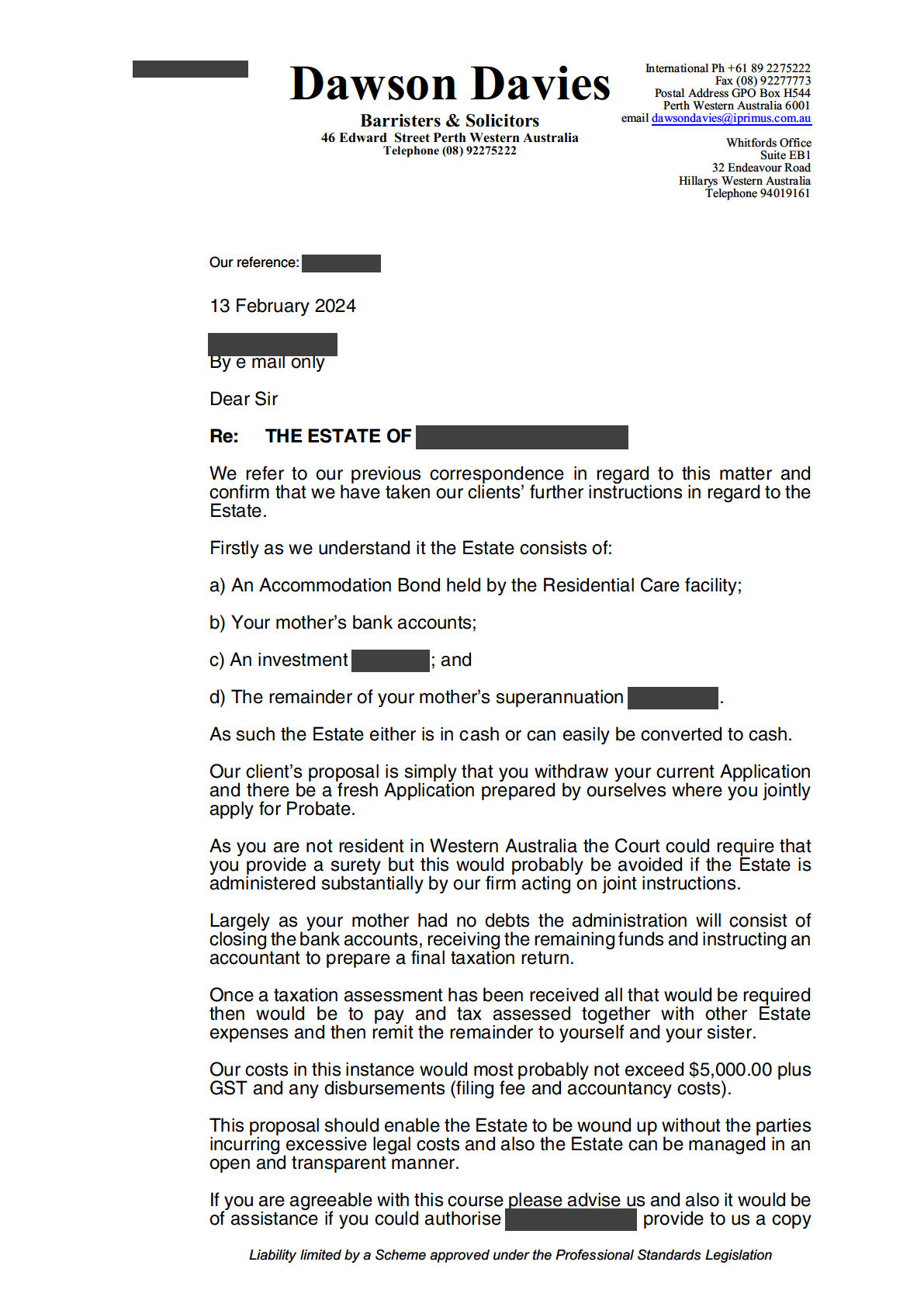Part I - Now I know why people despise probate lawyers
I've always thought lawyers were honest and acted with integrity. I was wrong.

As an accountant and management consultant, I've always thought that lawyers operated in much the same way in terms of their profession and conduct. Lawyers or solicitors are also classified as providing their clients "professional services", albeit off the legal variety. Whilst accountants provide "professional services" of the financial variety, tax advisors provide tax advice and consultants tend to provide all of those unofficially whilst also provide every other variety of service in between. If I held any belief, I probably would hold the view that lawyers were likely to be more moral and have a greater level of integrity than those such as myself as a consultant.
These days consultants tend to receive quite a bad reputation, as purportedly being these mysterious and shady characters that operate behind the scenes of large organisations and government institutions, operating outside of the public purview, concocting grand plans and orchestrating outcomes. Working for the highest bidder, with no loyalty, or preference in the outcomes, provided we can profit. All of which is kind of true, except most of us don't get paid as well as you'd imagine.
Whereas lawyers, bring to mind thoughts of "speaking the truth and only the truth", being purveyors of the law and "fighting for justice" for their clients. Even if their clients are guilty of manslaughter, they still to me evoke thoughts of them being good for promoting the better side of the killer in court. At the very least, I held the view that a solicitor would hold themselves to being trustworthy, have integrity and provide advice on the law.
The entire illusion has been shattered recently through dealings with my co-executor and caveator's solicitors as her representatives. Never in my career or in any other capacity have I encountered such nefarious conduct, blatant deception, distortion and misrepresentation of legalities and abject arrogance. With every correspondence I receive from them, my rage and distrust only grows stronger.
I won't mention their "pre-school level " overuse of capitalisation of nouns (actually, any word) for no apparent reason. Sorry, it's not correct not even from a "legal perspective", it's just wrong and makes your correspondence read as if it was written by a poorly educated child.
I recognise that they are representing my co-executor and are not acting in my interest but I would have hoped that they would still hold themselves to some level of integrity and keep to a level playing field rather generating misinformation and misquoting the law. I could understand if it was incompetence or unintentional, if they had simply misinterpreted the law. However, what I have received from my caveator's solicitors has been pure and divisive manipulation of the law and the distortion of facts, used as a means to add credibility to their purported outcomes or consequences of refusing their demands, used as threats in order to coerce me into submission, to achieve their desired outcome. To put simply, "lies" they are just plain lies.
The context to this series of correspondence is that I have my reservations as to their motives given they are acting in their client's interests and they filed the caveat of her behalf. I have never spoken with them directly and have no knowledge of their credentials or reputation.
I've redacted the personally identifiable information from the samples but have no problem with sharing the firm's details which if you're the market for such tactics sharing them can only do them a favour.
The proposal

Quite simply
On the face of it, it doesn't appear to be unreasonable. If you don't stop and think about what they are saying. In fact, they make it appear as innocuous and very straightforward, would be difficult not to accept.
So they do not explain at any point - be that previously or since this proposal, despite directly asking them several times - why I must withdraw my application and replace it with a one that is prepared by them?
Nowhere is it stated, be that within the Administration Act 1903, the Non-Contentious Probate Rules 1967 or the Rules of the Supreme Court 1971 - that an application for probate for jointly appointed administrators must be made in the form of a single application. No where does it state that we are required to file a joint application either.
And why would I agree to them prepare said application? I didn't hire them. I don't know them. Given my dealings with them and the questionable I wouldn't ever hire them if I had a choice and I don't have the money to pay for them.
Non-resident
Ah that old chestnut! They've made sure that I know where I live in every correspondence. And everyday, I am thankful that I do not reside in their simple little antiquated backwater and raciest capital of the world otherwise known as Western Australia.
What they fail to understand regarding my residency and the implications of it regarding the requirement for sureties is that his client must also provide a surety owing to me being an out-of-the-state beneficiary. I'm also firmly of the belief that the legislation as it is written refers to the "administrators applying for letters of administration" of an estate not "executors applying for grant of probate" to administer an estate. There is a clear distinction in the text and the section that the requirement is specified in is entitled "Probate and Administration" and all references to sureties are made with explicit mention of granting administration not granting probate. The sections before and after make mention of "probate or administration" signifying that the clause applies to both scenarios, whereas this particular section makes only mention administration.
To further support my interpretation, I did some research into the origin of that provision to understand the context and the events for which it attempted to mitigate. Generally, all laws are reactionary responses to an actual or perceived threat of an eventuality. This one is no different. It was carried over from the English Rule of Law, dating back to 1700' and the act
If I had the money, I would take on the state itself if the Court tried to apply that provision.
To be continued ... in part II we use ChatGPT to analyse the factual accuracy and implications of each statement made by Dawson Davies.



